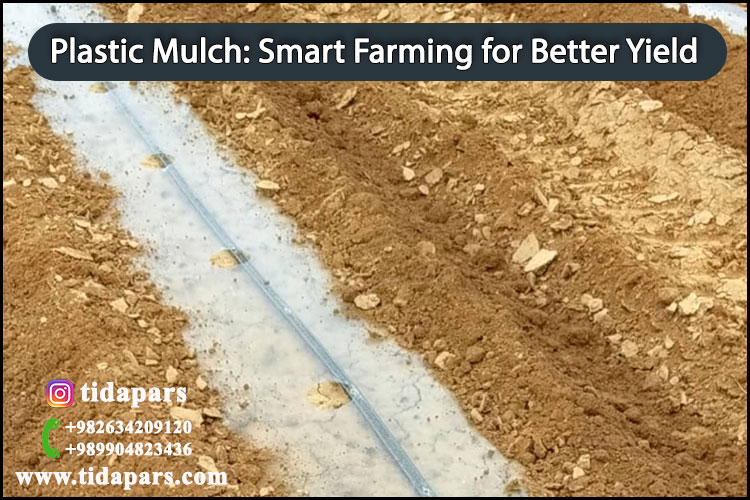Introduction: Rethinking Traditional Farming
As global demand for agricultural products continues to grow, traditional farming methods alone are no longer sufficient. One innovative solution widely adopted around the world is plastic mulch farming — a system that helps control weeds, conserve water, and increase productivity, especially in vegetable and fruit cultivation.

What Is Plastic Mulch Farming?
Plastic mulch farming involves covering the soil surface with a layer of film after soil preparation. Slits or holes are then made in the plastic, and seeds or seedlings are planted.
This layer acts as a barrier to protect the soil from moisture loss, weed growth, and sudden temperature changes, creating ideal conditions for plant development.
Top Crops for Mulch-Based Cultivation
1. Tomatoes
Tomatoes benefit greatly from plastic mulch — it promotes early growth, improves fruit uniformity, and keeps produce off the soil.
2. Cucumbers and Squash
mulch helps maintain warm soil temperatures and reduce evaporation, supporting optimal early growth.
3. Strawberries
Widely cultivated with black mulch, strawberries grow cleaner, healthier, and are less susceptible to disease.
4. Peppers, Eggplants, Watermelons, and Melons
These crops respond well to mulch-based farming with improved yields, reduced herbicide use, and consistent soil moisture.

Key Benefits of Plastic Mulch Farming
✅ Water Conservation
Plastic mulch can reduce evaporation by up to 70%, preserving soil moisture and enabling farmers to use less water while maintaining crop health.
✅ Weed Suppression
By blocking sunlight, the film prevents weed seed germination, significantly reducing the need for herbicides.
✅ Soil Temperature Regulation
Mulch insulates the soil, warming it during cold months, encouraging faster germination and better root development.
✅ Enhanced Crop Quality
Fruits and vegetables remain clean, disease-free, and market-ready since they don’t come in contact with soil.
✅ Earlier Harvests
This layer accelerates crop development, often leading to harvests several weeks earlier, which helps gain a competitive edge in the market.
✅ More Efficient Fertilizer Use
The plastic layer prevents nutrient leaching, keeping fertilizers concentrated around plant roots and improving nutrient uptake.
Challenges and Practical Needs
While plastic mulch farming offers numerous advantages, implementing it requires specific tools and planning, including:
A mulch layer machine for laying and securing the plastic film
Equipment for making planting holes accurately
And most importantly: a fertilizer applicator system that works under the plastic mulch without disrupting the setup
Fertilizing in Plastic Mulch Systems
One of the main challenges in plastic mulch farming is how to deliver nutrients efficiently to crops without removing or damaging the it. Broadcasting fertilizer from above is ineffective and wasteful.
Instead, a targeted approach is required — ideally, fertilizer should be applied in rows beneath the mulch, close to the root zone, with minimal labor and maximum precision.
The Role of Mulch Fertilizer Applicators
This is where mulch fertilizer applicators come into play. These machines are designed to apply granular or powdered fertilizer directly beneath the mulch layer, alongside crop rows, during or after plastic laying.
A mulch fertilizer applicator offers:
Precise fertilizer placement
Adjustable depth and rate of application
Compatibility with various soil types and crop spacing
Seamless integration with mulch
layer equipment
Why Choose a Mulch Fertilizer Applicator?
For farmers embracing plastic mulch systems, a mulcher applicator is the missing piece of the puzzle. It ensures:
Better nutrient efficiency
Reduced fertilizer costs
Healthier, faster-growing crops
And minimized environmental impact through controlled usage

TIDAPARS Mulch Fertilizer Applicator: Precision Meets Productivity
At TIDAPARS, we design machines tailored to modern farming practices.
Our Mulch Fertilizer Applicator is built to meet the exact needs of plastic mulch farming — accurate fertilizer delivery, easy adjustment, robust construction, and compatibility with plastic-laying systems.
Whether you’re growing tomatoes, melons, or strawberries, this tool streamlines your operations and boosts your yield.
Conclusion: A Smarter Future for Agriculture
Plastic mulch farming represents the future of efficient, sustainable agriculture. It reduces water usage, enhances crop quality, and minimizes weed control efforts.
To unlock its full potential, integrating the right tools is essential.
✅ If you’re serious about boosting productivity and sustainability, a mulch fertilizer applicator should be part of your farming strategy.








